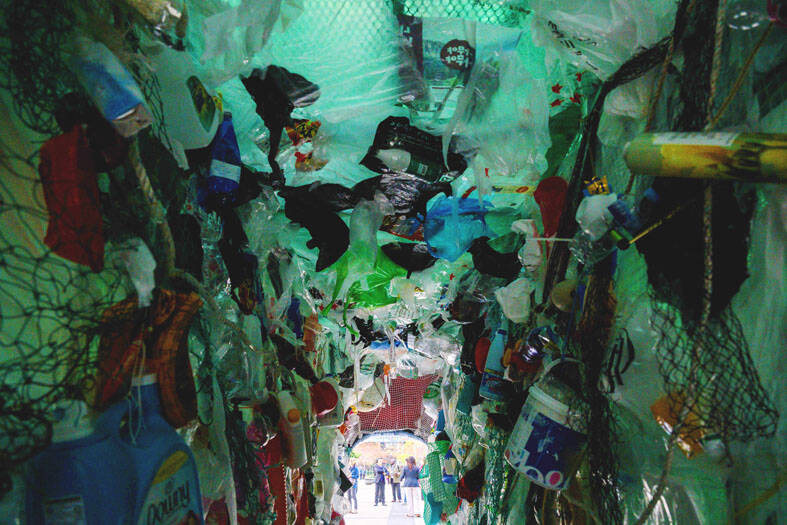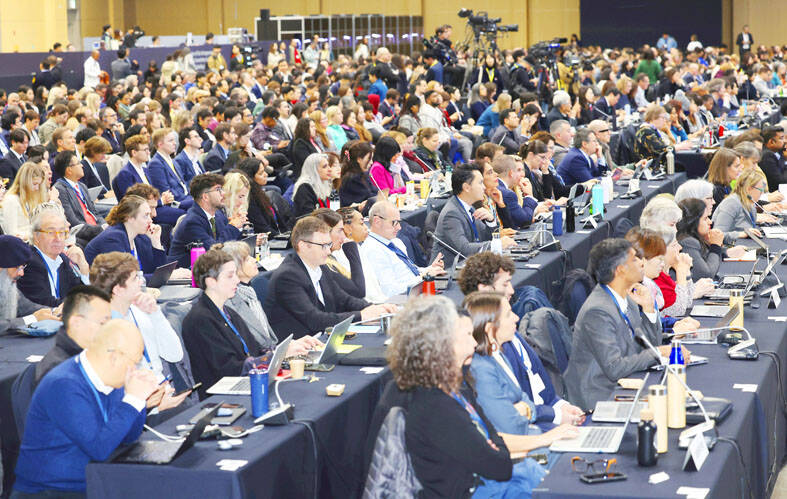A final round of talks on a treaty to curb plastic pollution opened yesterday, with deep differences between nations emerging almost immediately.
The meeting opened just hours after a chaotic end to the COP29 climate talks in Baku, which agreed to a boost in climate funding that developing countries slammed as insufficient.
Opening the plastics meeting, the Ecuadoran diplomat chairing the talks warned nations that the conference was about “far more than drafting an international treaty.”

Photo: AFP
“It is about humanity rising to meet an existential challenge,” Luis Vayas Valdivieso, chair of the Intergovernmental Negotiation Committee, told an opening plenary in South Korea’s Busan.
Plastic pollution is so ubiquitous that it has been found in clouds, the deepest ocean trenches and even human breastmilk, and while almost everyone agrees it is a problem, there is less consensus on how to solve it.
Among the most contentious issues are whether the treaty should cap plastic production, a possible ban on chemicals feared toxic to human health and how to pay for implementation. The deep differences have dogged four previous rounds of talks over the past two years, resulting in a lengthy and contradictory draft treaty running more than 70 pages.

Photo: AP / Yonhap
Valdivieso has produced an alternative document intended to synthesize the views of delegations and move negotiations forward, but several countries, including Russia and India, immediately objected to it.
“The reality is that many countries do not see themselves represented in this paper,” Saudi Arabian delegation head Eyad Aljubran said on behalf of the Arab group.
In 2019, the world produced about 460 million tonnes of plastic, a figure that has doubled since 2000, according to the Organisation for Economic Co-operation and Development.
Plastic production is expected to triple by 2060.
More than 90 percent of plastic is not recycled, with more than 20 million tonnes leaking into the environment, often after just a few minutes of use.
Plastic also accounts for about 3 percent of global emissions, mostly linked to its production from fossil fuels.
Some countries, including the so-called High Ambition Coalition (HAC), which groups many African, Asian and European nations, want the treaty to address the entire “lifecycle” of plastics. That means limiting production, redesigning products for reuse and recycling, and addressing waste.
On the other side are countries, largely oil producers like Saudi Arabia and Russia, which want a downstream focus on waste alone.
The HAC wants binding global targets on reducing production and warned ahead of the Busan talks that “vested interests” should not be allowed to hamper a deal.
Some observers said the talks are likely to falter and be extended, but by yesterday afternoon, Valdivieso won agreement for negotiations to begin on the basis of his slimmed-down document.
“I thank you very much for your flexibility,” he told the room.
The short time frame has some environmental groups worried an agreement would be watered down to ensure something is signed.
The key to any accord would be the US and China, neither of which have openly sided with either bloc.

‘ABUSE OF POWER’: Lee Chun-yi allegedly used a Control Yuan vehicle to transport his dog to a pet grooming salon and take his wife to restaurants, media reports said Control Yuan Secretary-General Lee Chun-yi (李俊俋) resigned on Sunday night, admitting that he had misused a government vehicle, as reported by the media. Control Yuan Vice President Lee Hung-chun (李鴻鈞) yesterday apologized to the public over the issue. The watchdog body would follow up on similar accusations made by the Chinese Nationalist Party (KMT) and would investigate the alleged misuse of government vehicles by three other Control Yuan members: Su Li-chiung (蘇麗瓊), Lin Yu-jung (林郁容) and Wang Jung-chang (王榮璋), Lee Hung-chun said. Lee Chun-yi in a statement apologized for using a Control Yuan vehicle to transport his dog to a

INDO-PACIFIC REGION: Royal Navy ships exercise the right of freedom of navigation, including in the Taiwan Strait and South China Sea, the UK’s Tony Radakin told a summit Freedom of navigation in the Indo-Pacific region is as important as it is in the English Channel, British Chief of the Defence Staff Admiral Tony Radakin said at a summit in Singapore on Saturday. The remark came as the British Royal Navy’s flagship aircraft carrier, the HMS Prince of Wales, is on an eight-month deployment to the Indo-Pacific region as head of an international carrier strike group. “Upholding the UN Convention on the Law of the Sea, and with it, the principles of the freedom of navigation, in this part of the world matters to us just as it matters in the

Taiwan yesterday denied Chinese allegations that its military was behind a cyberattack on a technology company in Guangzhou, after city authorities issued warrants for 20 suspects. The Guangzhou Municipal Public Security Bureau earlier yesterday issued warrants for 20 people it identified as members of the Information, Communications and Electronic Force Command (ICEFCOM). The bureau alleged they were behind a May 20 cyberattack targeting the backend system of a self-service facility at the company. “ICEFCOM, under Taiwan’s ruling Democratic Progressive Party, directed the illegal attack,” the warrant says. The bureau placed a bounty of 10,000 yuan (US$1,392) on each of the 20 people named in

The High Court yesterday found a New Taipei City woman guilty of charges related to helping Beijing secure surrender agreements from military service members. Lee Huei-hsin (李慧馨) was sentenced to six years and eight months in prison for breaching the National Security Act (國家安全法), making illegal compacts with government employees and bribery, the court said. The verdict is final. Lee, the manager of a temple in the city’s Lujhou District (蘆洲), was accused of arranging for eight service members to make surrender pledges to the Chinese People’s Liberation Army in exchange for money, the court said. The pledges, which required them to provide identification